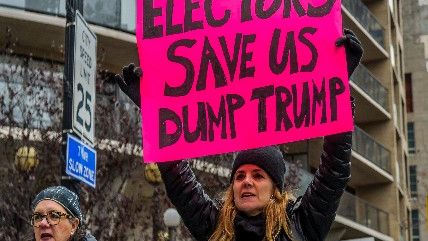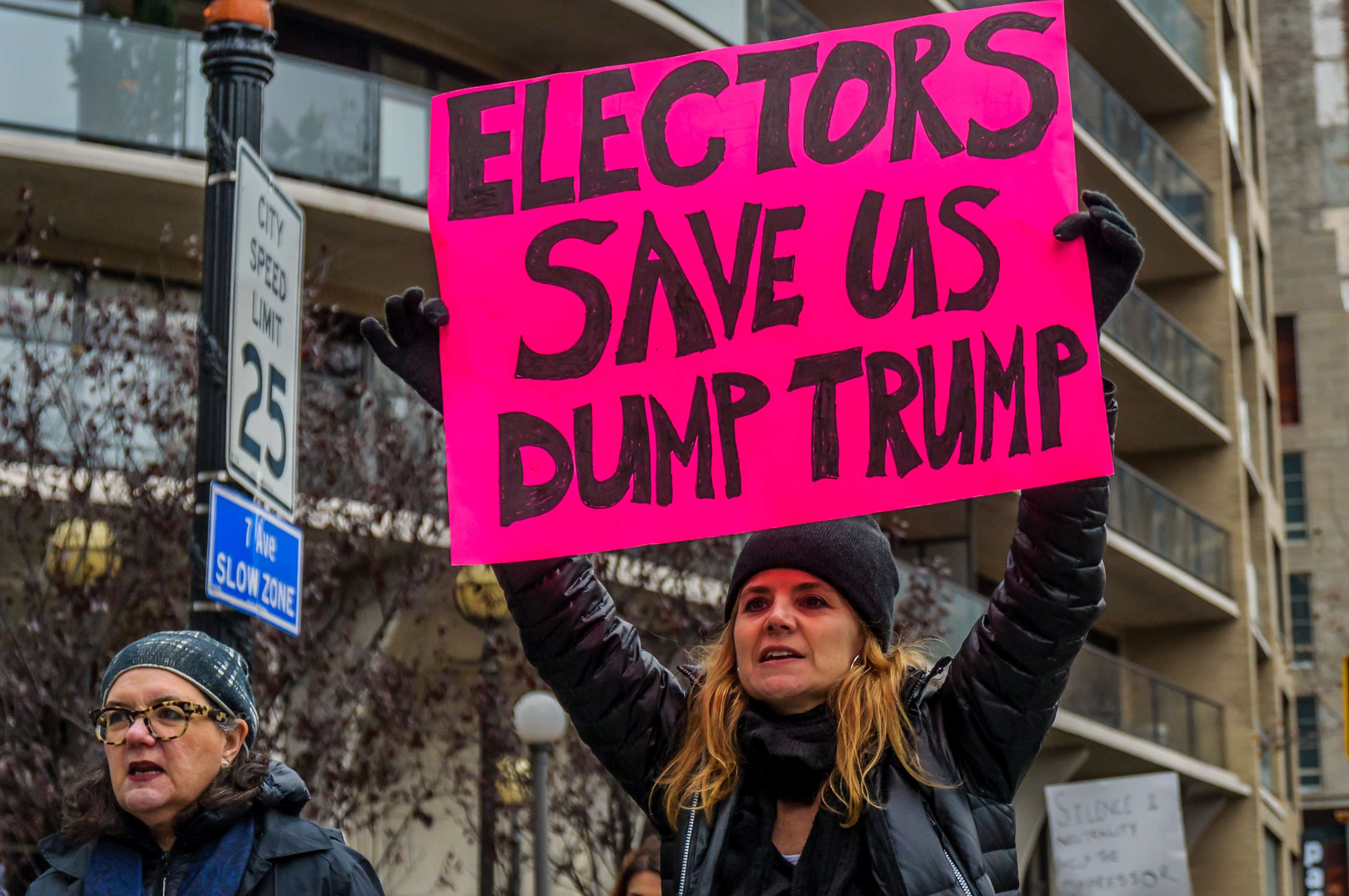Why 'Hamilton Electors,' Who Would Make Hillary Clinton President, Are as Dead as Their Namesake
Desperate Democrats would subvert the Constitution to deny Donald Trump the Oval Office.


Donald Trump's surprise election has made the Electoral College a thing again. Sad Democrats and progressives, still looking for anyone and anything to blame besides their feckless candidate and the inept, celebrity-obsessed campaign she ran, are repeating their stages of grief from 2000, when Al Gore won the popular vote but lost the White House to George W. Bush. In both cases, the Dems could fixate on the Electoral College, that awful holdover from the country's slave-owning past. But despite high-profile attempts to bend the rules before the Electoral College votes on December 19, there's no way in hell that Trump is not going to be the next president. Whatever you think of either him or Clinton, that's not a bad thing. It's the way the rules are supposed to work, and for good reasons.
"Mr. Trump is unfit to serve," reads an online petition to "make Hillary Clinton president." "His scapegoating of so many Americans, and his impulsivity, bullying, lying, admitted history of sexual assault, and utter lack of experience make him a danger to the Republic," runs the argument, which has nearly 5 million signatures and implores "conscientious electors" to vote for Clinton regardless of how the people they represent voted.
Alas for them, a presidential election is really 51 elections (all the states, plus Washington, D.C.), in the same way the World Series consists of up to seven individual baseball contests, rather than a competition determined by which team scores the most total runs. The Electoral College, which guarantees at least three representatives to each state, affects how people vote on a state-by-state basis and voting strategies, like campaign strategies, would surely be different in a system driven purely by popular-vote totals.
Judge Richard A. Posner of the U.S. Court of Appeals for the 7th Circuit has argued that, for all its faults, the oft-maligned system is a bulwark against the mass chaos that would ensue in the event of a razor-thin popular vote, which would require an extensive recount of scores of millions of votes in every municipality. If you thought the county-by-county mess of Florida's aborted 2000 recount was insufferable, try to imagine one on a nationwide basis. It could conceivably take years.
So when the Electoral College gathers next week, there's no reason to expect the requisite 37 Republican electors would flip to Clinton or deny Trump his needed 270 votes to clinch the presidency by voting for another Republican. But that doesn't mean such wishful fantasizing about "faithless electors" stopping Trump isn't taking place.
Harvard law professor (and nominal 2016 Democratic presidential candidate) Lawrence Lessig has offered the pro bono services of his legal firm to help the self-described "Hamilton electors," Democratic electors lobbying their Republican counterparts to not vote for Trump. These electors named themselves after the founding father and inspirer of hip-hop musicals, Alexander Hamilton, because of Hamilton's argument that the Electoral College is needed to prevent someone without the "requisite qualifications" from assuming the office of the presidency.
In an op-ed at The Washington Post, Lessig wrote:
…if the electoral college is to control who becomes our president, we should take it seriously by understanding its purpose precisely. It is not meant to deny a reasonable judgment by the people. It is meant to be a circuit breaker—just in case the people go crazy.
In this election, the people did not go crazy. The winner, by far, of the popular vote is the most qualified candidate for president in more than a generation. Like her or not, no elector could have a good-faith reason to vote against [Hillary Clinton] because of her qualifications. Choosing her is thus plainly within the bounds of a reasonable judgment by the people.
At the Post's Volokh Conspiracy legal blog, George Washington University law professor Orin Kerr (a Republican who publicly supported Clinton this election) wrote that Lessig wants to have it both ways. That is, Lessig wants electors to exercise their independence to vote for the best person as long as the public didn't go crazy, but also respect the principle of "one person, one vote." Kerr writes that "he's not sure these two ideas can be coherently merged," adding:
It's true, at least as I understand it, that the original design of the electoral college was for electors to exercise their independent judgment about who would be the best president. But if that's right, it's hard to see how electors would be exercising their independent judgment by deferring to the popular vote. That's especially so because they would be deferring to the popular vote in other states that didn't even vote for them as electors.
So is all the recent squawking about the strange system which has elected every president in the history of the republic just the last, best hope of Never-Trumpism? Pretty much. Kerr told Reason via email that he believes Lessig is arguing in good faith, and recalled that Lessig had raised concerns about the electoral college well before the election. Yet "are some people acting out of expedience rather than principle?" he asks. "I assume so, but I assume so for everything election-related."
Throughout U.S. presidential history, there have been over 150 faithless electors (just nine since World War II). While 29 states and the District of Columbia have laws that punish such dissenters with fines or even jail time, not one such elector has ever been prosecuted for going his own way, including Roger MacBride in 1972, who cast the first electoral vote for a woman (Tonie Nathan was the vice-presidential candidate on the Libertarian ticket led by John Hospers). Even if an Electoral College coup were to take place, every state's electoral votes have to be certified by that state's secretary of state, and that person has the authority to simply disqualify the votes or refuse to certify the totals. Either way, it holds up the votes from heading to Washington and being counted by Congress, and thus holds up the lawful election of the president.
Longtime political analyst and author of The People's Choice, a 1996 novel about faithless electors, Jeff Greenfield explained to Reason in a phone interview that despite the marked divisions within the GOP before the election, there's zero indication that the party intends to thwart Trump now that he's president-elect. Greenfield noted that in 2004, John Kerry would have been elected president if just 60,000 voters in Ohio had cast their ballot for him and not Bush. Yet with Bush earning 3 million more total votes nationally, Greenfield says a Kerry win in the Electoral College might have led to a bipartisan push to ditch the system.
"If you had back-to-back elections where both parties lost [despite winning the popular vote], you might have had a bigger brouhaha," he says. But today's GOP is happy with November's outcome despite whatever misgivings the party might have about Trump. "Right now the way Republicans look at it is, 'If there's a split, we're the beneficiaries.'"
Getting rid of the Electoral College would require changing the Constitution, which isn't going to happen for a number of reasons, not least of which is the fact that smaller states have absolutely no incentive to give up the influence afforded to them by the current system. However, a number of states are trying to find a legal workaround to the Electoral College, most notably with the National Popular Vote interstate compact.
Ten states and D.C.— all of them deep "blue" and liberal—have adopted legislation that would become binding if enough states to equal 270 electoral college votes join them to award their state's electoral votes to the winner of the national popular vote, even if their own state was won by a different candidate.
The 11 jurisdictions in question (California, D.C., Hawaii, Illinois, Maryland, Massachusetts, New Jersey, New York, Vermont, and Washington) are currently responsible for 165 electoral votes. That's nothing to sneeze at, but it's a long way to 270.
The way the current system is constructed, it's difficult to imagine a number of highly populated swing states like Florida, Ohio, Virginia, and Pennsylvania handing over their considerable clout for the sake of the "principle" of the popular vote. And there's nothing to offer the smaller states who would almost certainly be ignored entirely in a popular vote scenario.
Though the Electoral College has been benefiting Republicans of late, the largely forgotten 2004 result shows how easily that narrative could be flipped. Regardless, the liberal passion project named for Alexander Hamilton seems about as cold as the man himself after feuding with Aaron Burr.
